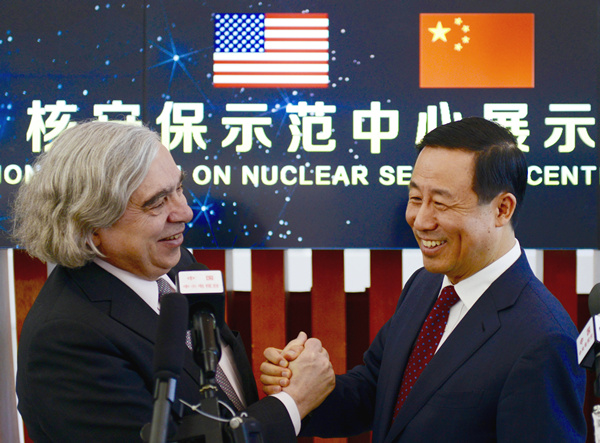Advancing real nuclear security cooperation
Updated: 2016-03-30 07:57
By Shen Dingli(China Daily)
|
|||||||||
 |
|
Xu Dazhe, head of the China Atomic Energy Authority, greets Ernest Moniz, US secretary of energy, at a ceremony in Beijing on March 18. Wei Xiaohao / China Daily |
The fourth Nuclear Security Summit, to be held in Washington on Thursday and Friday, is one of the few major signature programs initiated by US President Barack Obama. The others include health reform, financial reform, ending the war on terror, resetting US-Russia relations, Global Zero and mitigating climate change etc.
Obama has succeeded in his climate change agenda, but failed in "resetting" relations with Russia. The withdrawal of US combat troops from Iraq seems to have caused more harm than good, given the rise of the Islamic State, and he has not made any substantial progress on the Global Zero campaign to eliminate nuclear weapons. In the light of these facts, the Nuclear Security Summit has become Obama's major policy initiative to promote global security against nuclear terrorism.
Nuclear security is a very important security issue. Given the lethality of nuclear weapons, the wide use of civilian nuclear energy and the transnational nature of global terrorism, and the possible coupling of such elements, the international community is haunted by the nightmare of nuclear terrorism. Fears over the theft of nuclear weapons and materials, as well as sabotage of nuclear facilities, are well founded. Indeed no nuclear-capable state has impregnable nuclear security, as assessed by the three Nuclear Materials Security Indices, published by the Nuclear Threat Initiative in 2012, 2014 and 2016.
No wonder Obama has chosen nuclear security as one of his top agendas. Since the Nuclear Security Summit is aimed at forging a consensus on heightened state protection of nuclear facilities and control of nuclear materials and global cooperation in this regard, the international community expects it to make exemplary progress.
The US and China are two of the major nuclear stakeholders. Since both are nuclear-weapon states and major producers of nuclear power for civilian use, they share a responsibility to place their nuclear weapons and nuclear facilities under most stringent state security.
As of the end of October 2015, in Chinese mainland 27 nuclear generating units had been in operation, with a total installed capacity of 25.5 GW, and another 25 nuclear generating units with a total installed capacity of 27.51 GW had been under construction.
The scale of China's ongoing capacity construction is the highest in the world, and its total nuclear power capacity, in terms of energy and number of plants, including both operational and under construction, is ranked fourth and third in the world.
Despite China's excellent record of nuclear safety and security, it faces challenges to make sure its growing civilian nuclear power program will be not be sabotaged. Thus Beijing-Washington cooperation to lift China's domestic capacity as well as those for other countries will ensure nuclear security for the Asia-Pacific region.
At the first Nuclear Security Summit in 2010, Beijing and Washington forged a partnership to co-build a China-based Center of Excellence on Nuclear Security, with China building and operating the facility and the US offering technical support. It was completed and started operations recently, and now stands as a tangible symbol of cooperation on nuclear security across the Pacific.
The last three Nuclear Security Summits have addressed various aspects of nuclear security, including the global nuclear security system, the International Atomic Energy Agency, nuclear materials, radioactive sources, nuclear security and safety, transportation, nuclear inspection, nuclear culture, intelligence cooperation, illegal trafficking and nuclear forensics, etc. The summits have also proposed 19 non-binding commitments or incentive measures.
China has been quick to implement some of these measures. It has also pledged to cut the use of highly enriched uranium as much as possible, depending upon the viability of its economy and technology. And it has helped Ghana convert its highly enriched uranium-based research reactor to a low enriched uranium-based one, making it less vulnerable to the threat of nuclear terrorism.
Besides, China is collaborating with the US to reconfigure Iran's heavy water reactor in Arak to make it more proliferation resistant. All these moves will help promote a "new type of major-country relationship" between China and US.
The author is a professor at and associate dean of the Institute of International Studies, Fudan University.
Related Stories
Nuclear security always a priority for Beijing 2016-03-29 08:13
China plays vital role in intl nuclear security cooperation 2016-03-28 13:54
Chinese president to visit Czech, attend nuclear security summit in US 2016-03-24 21:12
Xi visits Czech Republic, attends nuclear security summit in the US 2016-03-24 09:53
Today's Top News
Inspectors to cover all of military
Britons embrace 'Super Thursday' elections
Campaign spreads Chinese cooking in the UK
Trump to aim all guns at Hillary Clinton
Labour set to take London after bitter campaign
Labour candidate favourite for London mayor
Fossil footprints bring dinosaurs to life
Buffett optimistic on China's economic transition
Hot Topics
Lunar probe , China growth forecasts, Emission rules get tougher, China seen through 'colored lens', International board,
Editor's Picks

|

|

|

|

|

|







